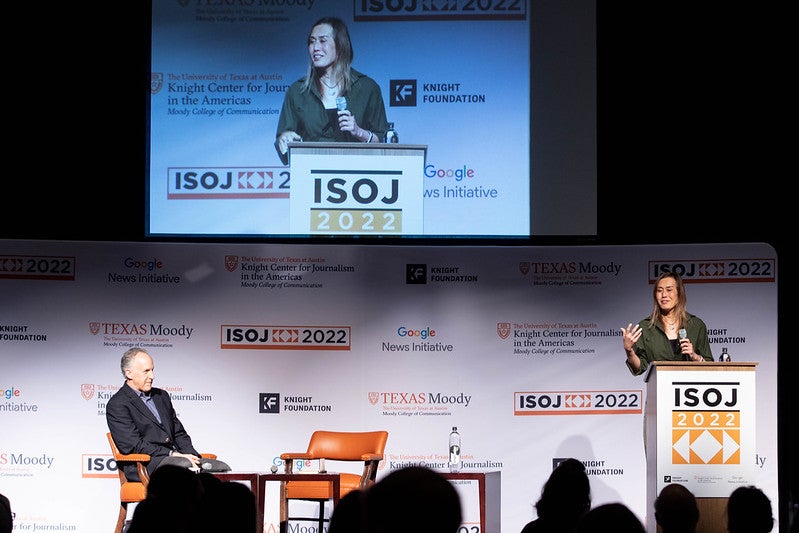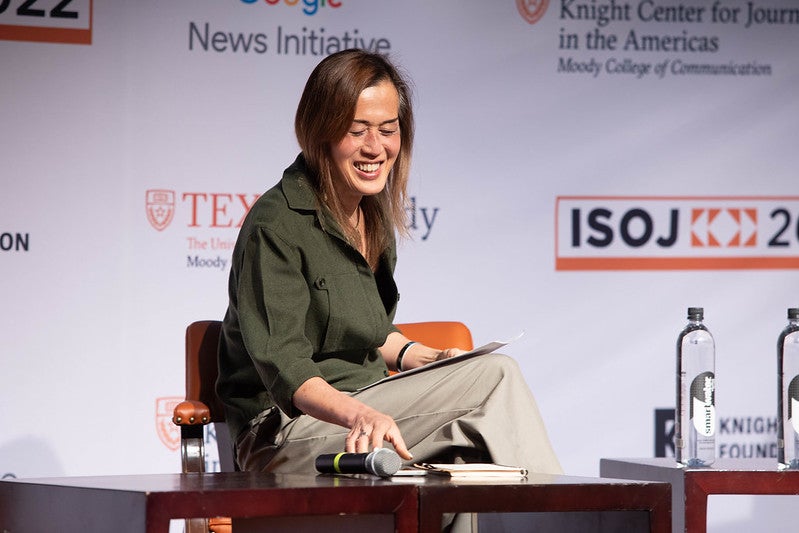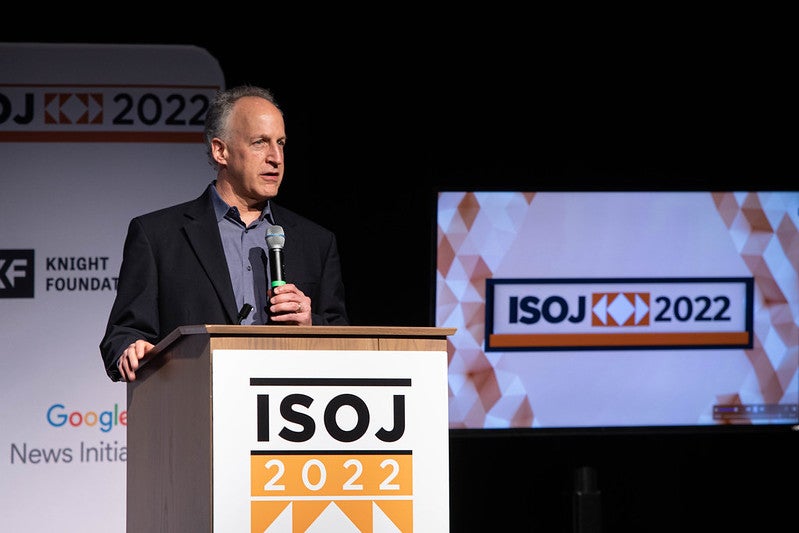In addition to representation, it is necessary to increase sensitivity in newsrooms, says journalist Gina Chua

The question “What is news?” guided the participation of journalist Gina Chua on the second day of the 23rd International Symposium on Online Journalism (ISOJ). With a career of over three decades, the current executive editor of Reuters will very soon start a new phase as executive editor at the media startup Semafor, which is expected to launch globally online in the second half of 2022, according to The New York Times.
Chua began her talk April 2 challenging the use of technology in the news industry. Using as an example the companies Uber and Waze, which, according to her, “revolutionized the whole urban transport system” through the use of user mobility data, the journalist pondered what could happen if media companies rethought their processes and the production of news using the same logic.
“We’ve had tons of innovations and we’ve seen some of them on stage [at ISOJ] and there are lots of people in the room who have worked with innovations. And there have been some really big improvements in storytelling, graphics, distribution, multimedia, and so on. But what could we do if we really started with a completely fresh slate? What if we really thought about the structure of information and the needs of our audiences and our communities?” Chua asked.
“In other words, why are we trying to use the tools of the digital age to recreate the products which we had in the pre-digital age? Why aren’t we rethinking our products completely? Again, this is like Uber deciding to improve the cab dispatch system,” she joked.
Chua argued that it is important to rethink what is news based on the needs of the public and the community that is being served by the journalism produced by each media. And, in this sense, it is important to shed light on who are the people who are leading these processes.
“What is the definition of newsworthy? Dog bites man is not newsworthy. Man bites dog is, right? It’s unusual. But what’s normal? Who decides what’s normal? What’s unusual to you is not unusual to me, and historically, the people who have determined what is unusual are people of a certain demographic, and that needs to change. That’s why representation is important, but that’s why sensitivity is also important in the news assigning process,” she said.

“You’ve got to find new perspectives, that’s really important, and you’ve got to decide what is normal, so you can decide what is abnormal, and that makes it newsworthy. And the best gauge of what’s normal is what your community thinks is normal, and that’s where you have to get closer to your community,” she explained.
Chua said that often something is “normal” or “common” but that doesn’t mean it shouldn’t be reported – quite the opposite. This is the case with the high rates of police killings of Black people in the United States, she exemplified. And the question of what makes something newsworthy is even more valuable in a digital news production environment.
“In a digital age, we can appeal to and understand different audiences. It also gives us the ability to bring multiple perspectives to stories so that we can flag prevailing narratives and counter-narratives to our different audiences. To be clear, it’s not wrong to focus and serve your audience well. But those audiences are better served when you tell them about the other perspectives of issues as well,” Chua said.

Neil Chase, CEO of CalMatters, a site that provides local coverage of California, facilitated Chua’s talk. After the journalist’s speech, he asked her how she intends to address the issue of representation in her new position at Semafor.
“Representation really does matter and I do think we have not done enough as an industry to both get more diverse people into newsrooms, but more importantly to get them in positions of influence,” Chua replied.
But representation alone is not enough, continued the journalist, who is a transgender woman.
“You could try, but it’s really hard to have one of everything in a newsroom, and it’s too much of a burden on one person. Reuters can’t come to me and say ‘hey, we’re writing a story about trans issues, what do you think?’ It’s not my job to represent the entire community. Yes, I may have more sensitivity to it than other people. But that’s not fair. That’s not fair to me. That’s not fair to the organization. It’s not fair to the trans community either,” she said.
That’s why it’s important for the entire newsroom to be more sensitive to different issues, Chua said, including to better discern what is news. “What we have to do as an industry is to build better sensitivity, so that you understand that there are questions that need to be asked, you don’t make assumptions; that you reach out and you try to understand the resources you can go to about that issue. It’s better that we train everyone to be more understanding that their point of view isn’t the only point of view . . . and I think some of that has to do with rethinking what news judgment really is,” she said.

